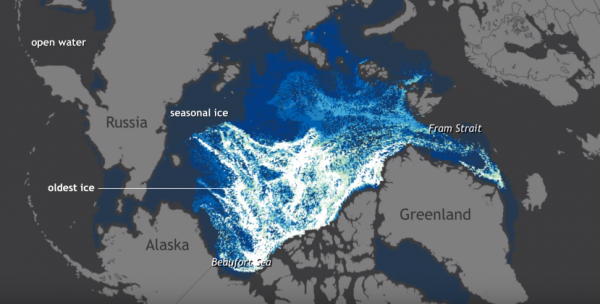By Angel Soleil, | November 06, 2016

A new study has revealed a way to calculate the loss of sea ice by the amount of carbon dioxide emitted. (YouTube)
A new study that openly links the amount of carbon dioxide released annually in the Earth's atmosphere to the amount of Arctic sea-ice lost could help scientists predict future trends of disappearing sea ice in the Arctic.
A study published in the journal "Science" reveals a new calculation that shows how prior climate models miscalculated how much ice is lost in the Arctic. The journal reported that the scientists analyzed the area of summer sea ice recorded between the years 1953 and 1978, and the years 1979 through 1997. They discovered that for each metric ton of carbon dioxide emitted, about 32 square feet of summer sea ice could be lost.
Like Us on Facebook
While it has been apparent that the Arctic is melting, scientists have found that it is melting quite faster than preceding studies have predicted. The quick melt down could have catastrophic consequences for the planet.
James Overland, a research oceanographer working with the US National Oceanic Atmospheric Administration (NOAA), told The Verge that "The Arctic is a real indicator of global change here, that's why we wrote the paper."
The new study explains that the Arctic experiences natural ice loss every summer, but only between 2.7 to 3.5 million square miles in average if ice persists. The ice acts as a refrigerator for the planet's poles, and the loss of ice would cause the global temperature to rise and cause the Earth to experience shifting ocean currents far worse than storms.
The scientists behind the study believe that climate models should be used to write policies about climate change, and can be used as a justification for protecting endangered species.
-
Use of Coronavirus Pandemic Drones Raises Privacy Concerns: Drones Spread Fear, Local Officials Say

-
Coronavirus Hampers The Delivery Of Lockheed Martin F-35 Stealth Fighters For 2020

-
Instagram Speeds Up Plans to Add Account Memorialization Feature Due to COVID-19 Deaths

-
NASA: Perseverance Plans to Bring 'Mars Rock' to Earth in 2031

-
600 Dead And 3,000 In The Hospital as Iranians Believed Drinking High-Concentrations of Alcohol Can Cure The Coronavirus

-
600 Dead And 3,000 In The Hospital as Iranians Believed Drinking High-Concentrations of Alcohol Can Cure The Coronavirus

-
COVID-19: Doctors, Nurses Use Virtual Reality to Learn New Skills in Treating Coronavirus Patients







